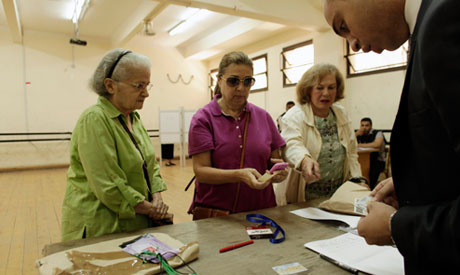
An Egyptian election official checks female voters' (AP)
As I stood in a line of around thirty women in front of Insaf Siry School in Shubra, the historic neighbourhood in central Cairo, the air was tense. The atmosphere was one of seriousness and worry rather than excitement about Egypt's first democratic presidential election.
Women from all age groups queued alongside me, some wearing full face veils, others headscarves and some unveiled. The majority were Muslims, but there was a fair number of Christians from the neighbourhood's large Coptic community.
A conversation started between Nevine and Kristin, both middle-aged government employees:
"Let's hope this time around the elections are not rigged and the votes in the boxes are the ones announced," Nevine said.
"No no no, this will be fair and clean, the election is being monitored, this is an international election," Kristin said, who will vote for Mubarak's last prime minister Ahmed Shafiq, like most people in the line.
Fear of the Muslim Brotherhood's domination of political life and possible infringements on personal rights had scared Christians and Muslims at this polling station into voting for Ahmed Shafiq.
Most voters at the five polling stations I visited in Shubra on Wednesday morning said they favoured Shafiq because he is "a strong man who can control the Islamists and the people in Tahrir" and is "best of the worst options."
"May God protect our country and appoint whoever is better," said many women.
Of 40 people Ahram Online spoke to, two backed Hamdeen Sabbahi, two favoured Abdel-Moneim Abul-Fotouh, one Amr Moussa, four Mohamed Morsi and the rest were supporting Ahmed Shafiq.
A few blocks away from each school was a table and two representatives from the Brotherhood informing voters of their polling station and electoral number, along with the advice to "vote for Morsi, the symbol of scale, last one on the list."
When I was interviewing people and taking photos many voters approached me, holding their ID cards and asking for helping to find which polling station they should go to.
Polling stations were free of campaign posters but the walls of the surrounding streets were covered with them. Mohamed Morsi and Ahmed Shafiq posters predominated, with some for Abdel-Moneim Abul-Fotouh and Hamdeen Sabbahi.
On my way back to work, I walked along the street where the Maspero march began last year and almost thirty people, mostly Coptic Christians, were killed by soldiers in front of the TV headquarters while protesting the burning of a church.
I couldn't help but remember the thousands of people marching in these same streets chanting for freedom and the downfall of the military regime.
Short link: